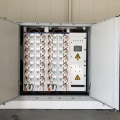As the demand for renewable energy sources continues to rise, more and more businesses are turning to commercial solar installations to power their operations. However, before any solar panels can be installed, it is crucial to understand the complex permitting and zoning requirements that come with commercial solar projects. These regulations can vary greatly depending on the location and type of installation, making it essential for businesses to have a thorough understanding of them before proceeding. In this article, we will delve into the world of commercial solar permitting and zoning, discussing key considerations and tips for navigating this critical aspect of solar panel installation.
By the end, you will have a better understanding of how to ensure a smooth and successful commercial solar installation process. Firstly, it is important to note that permitting and zoning requirements for commercial solar installations can vary depending on your location. Therefore, it is crucial to do your research and consult with local authorities before beginning the installation process. In general, there are three main factors to consider when it comes to permitting and zoning: location, size, and type of installation. Location is a key factor when it comes to obtaining the necessary permits for a commercial solar installation. Each city or county may have different regulations and requirements for solar installations, so it is important to check with your local planning department or building code office. They will be able to provide you with the specific permits needed for your area and guide you through the application process. The size of your installation also plays a role in the permitting and zoning process.
Generally, larger installations will require more permits and approvals compared to smaller ones. This is due to safety concerns and potential impact on the surrounding environment. It is important to accurately measure the size of your installation and ensure that it meets all necessary regulations. The type of installation also affects the permitting and zoning requirements. For example, ground-mounted solar panels may have different regulations compared to rooftop installations.
This is because ground-mounted panels may require additional building permits and inspections, while rooftop installations may have specific guidelines for placement and anchoring. Another important aspect to consider is the potential impact on the community and surrounding area. Zoning regulations are in place to ensure that the installation will not negatively affect the neighborhood or environment. This can include restrictions on noise levels, visual impact, and setbacks from property lines. It is important to note that obtaining the proper permits and adhering to zoning regulations is not only necessary for legal compliance, but also for the safety and success of your commercial solar installation. Failure to obtain the necessary permits can result in fines, delays, and even removal of the installation. In conclusion, understanding permitting and zoning requirements for commercial solar installations is crucial for a successful and compliant project.
Make sure to thoroughly research and consult with local authorities before beginning the installation process, and always adhere to all regulations and guidelines to ensure a safe and successful project.
Size Matters
use HTML structure with commercial property and Larger installations may require more extensive permits and approvals, as well as additional zoning considerations. It is important to carefully assess the size and layout of your property before beginning the installation process., do not use "newline character"Location Considerations
When it comes to commercial solar installations, location is key. The specific location of your property can determine the type of permits required and any restrictions or regulations that must be followed. For example, if your business is located in a historic district or a designated conservation area, there may be additional restrictions or guidelines for solar panel installations.Understanding Different Types of Installations
use HTML structure with roof-mounted, ground-mounted, and building-integrated installations, each with their own set of permitting and zoning requirements.It is important to research and understand the specific regulations and permits needed for your chosen type of installation. In conclusion, obtaining the proper permits and adhering to zoning regulations is crucial for a successful commercial solar installation. By carefully considering location, size, and type of installation, you can ensure a smooth and efficient process. Additionally, it is important to work closely with local authorities and consult with experienced solar installers to ensure all requirements are met.


